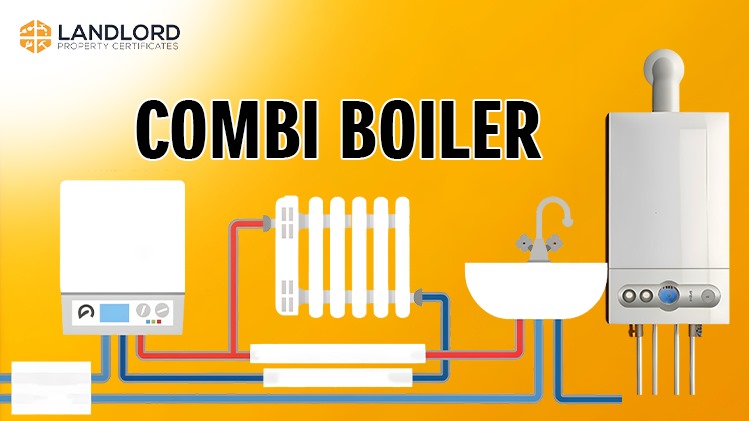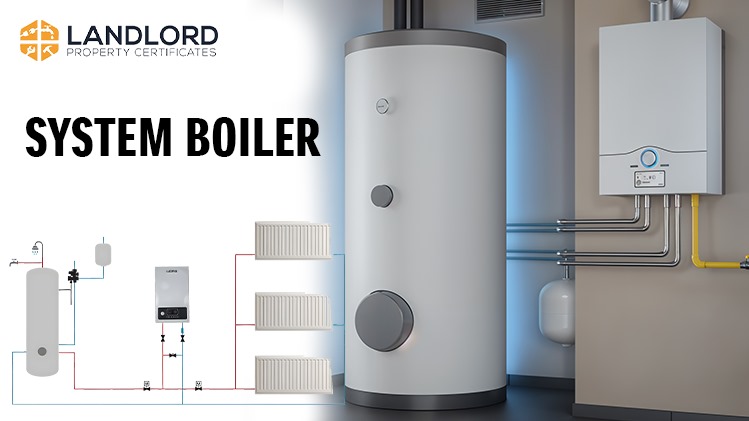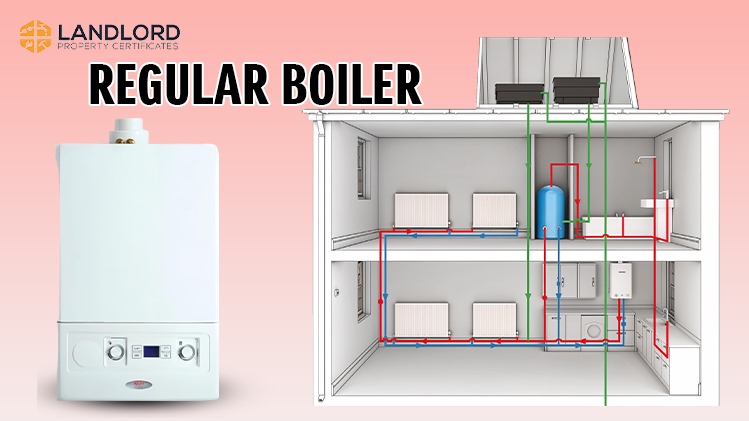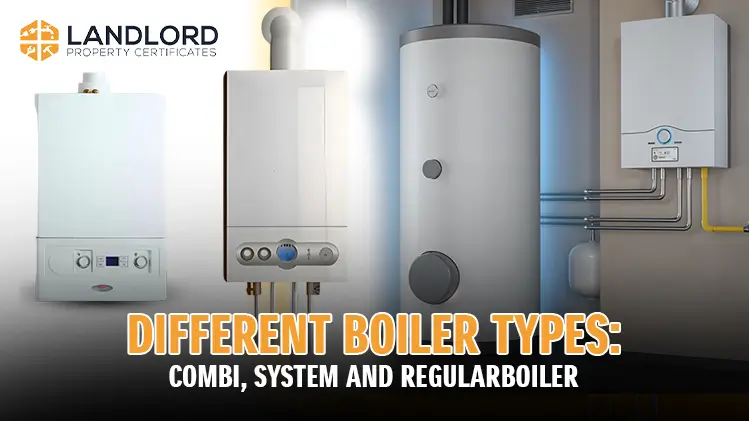A boiler is a heating system designed to heat water for central heating and domestic use. It transfers heat generated from fuel, such as gas or electricity, to water. This hot water is then distributed through pipes for radiators, taps, or underfloor heating, making it an essential part of modern homes.
Boilers come in three main types: Combi (Combination) Boilers, System Boilers, and Regular (Heat-Only or Conventional) Boilers. Each one has its own features and is designed to suit different homes:
- Combi Boilers are compact and don’t need separate water tanks or cylinders. They’re great for smaller homes or apartments where space is tight and hot water demand is manageable.
- System Boilers need a hot water cylinder but not a cold-water tank. These are ideal for medium to large homes, especially if you have multiple bathrooms and need hot water at the same time.
- Regular Boilers use both a hot water cylinder and cold-water storage tanks. They work well in larger homes with older heating systems or families that need lots of hot water.
The best boiler for your home depends on your space, household size, and water needs. Keep reading to find out which one suits you best!
What is a Combi Boiler?
A combi boiler, short for “combination boiler,” is a compact, efficient heating system that provides both central heating and hot water without the need for separate tanks or cylinders. It’s a popular choice in the UK due to its space-saving design and energy efficiency.
The cost of a typical combi boiler in the UK is around £1,500 on average, not including installation. Installation costs vary, generally adding between £500 and £1,500, depending on the complexity and location. Prices can go higher for premium models that offer advanced features and greater efficiency.

A combi boiler heats water directly from the mains when you turn on a tap or shower. This means you get hot water instantly without having to wait for a tank to heat up. It also provides central heating by circulating hot water through radiators or underfloor heating. The best part? No energy is wasted on heating a tank of water, so it’s a more efficient choice overall.
On average, a combi boiler lasts around 12 to 15 years, depending on usage and maintenance. Regular servicing is important to keep it running efficiently and to extend its life. After about 15 years, though, you may start to see a drop in performance, and it might make more sense to replace it. Regular maintenance can help you get the most value from your investment.
Combi boilers are ideal for smaller to medium-sized homes where hot water demand is moderate. They’re especially suited for homes with limited space since they don’t require a separate hot water tank. However, if you have a large family or multiple bathrooms with high simultaneous water demand, you might want to consider a system or regular boiler for better performance.
What are the pros and cons of a Combi Boiler?
The advantages and disadvantages of a combi boiler are listed below.
| Advantages of Combi Boiler | Disadvantages of Combi Boiler |
| Saves Space: No need for a separate water tank or cylinder. | Pressure Issues: They rely on mains water pressure, so performance can suffer with low pressure. |
| Compact and Tidy: The system is all in one unit, making it look neat. | Limited Hot Water Supply: If multiple taps are used at once, the water flow may decrease. |
| Instant Hot Water: Get hot water straight away, no waiting for a tank to heat up. | Potential for Mechanical Issues: Like any machine with moving parts, there’s a chance of malfunction over time. |
| Easy Maintenance: Combi boilers are so popular that it’s easy to find trained technicians for repairs. | No Power Showers: Not suitable for power showers because they don’t support gravity-fed systems. |
| Energy Efficient: Newer models can save on energy bills thanks to their high efficiency. | Not Ideal for Large Households: Multiple people needing hot water at the same time may cause issues. |
| Fresher Water: The water comes straight from the mains, so it’s cleaner and safer than stored water. | Solar Heating Compatibility: Many combi boilers don’t work well with solar water heating systems. |
| Cost-Effective Installation: Installing a combi boiler is cheaper and faster compared to other systems. |
What is a System Boiler?
A system boiler is a central heating system that connects directly to the mains water supply, heating water for radiators and a separate hot water storage cylinder. Unlike regular boilers, the system boiler doesn’t require a feed and expansion tank in the loft, making it more space-efficient. This design allows for a consistent supply of hot water to multiple taps or showers simultaneously, making it ideal for larger households with higher hot water demands.
The cost of a system boiler in the UK varies based on factors like brand, model, and installation specifics. On average, the boiler unit itself ranges from £700 to £2,500. When including installation, the total expense typically falls between £1,700 and £5,000.

A system boiler heats water from the mains for central heating and stores hot water in a separate cylinder, ensuring a steady supply for taps and showers. It’s ideal for larger homes with high hot water demands, as it supports multiple outlets without losing pressure. Key components like the pump and expansion vessel are built into the unit, making installation and maintenance easier.
On average, a system boiler lasts around 15 years, though this can vary depending on factors like maintenance and usage. Regular servicing can help extend its lifespan.
System boiler is perfect for larger homes with multiple bathrooms and high hot water needs. It provides hot water to several taps at once and is more energy-efficient than traditional boilers, thanks to built-in components like an expansion vessel and pump that improve water pressure and reduce energy waste.
What are the pros and cons of a System Boiler?
The advantages and disadvantages of a system boiler are listed below.
| Advantages | Disadvantages |
| High Hot Water Demand: Ideal for larger homes with multiple bathrooms, as it can supply hot water to multiple outlets simultaneously without compromising pressure. | Installation Space: Requires space for a hot water cylinder, which may not be suitable for smaller homes. |
| Space Efficiency: Unlike traditional systems, it doesn’t require a cold water tank, freeing up loft space. | Energy Loss: Stored hot water can lose heat over time, leading to potential energy waste. |
| Energy Efficiency: System boilers can be compatible with solar thermal systems, potentially enhancing energy efficiency. |
What is a Regular Boiler?
A regular boiler, also known as a conventional or heat-only boiler, is a traditional heating system that requires both a cold water storage tank and a hot water cylinder. The cold water tank, typically located in the loft, supplies water to the boiler, which heats it and then stores it in the hot water cylinder for later use. This setup allows for simultaneous use of hot water at multiple outlets without a drop in pressure, making it suitable for larger homes with high hot water demands.
A regular boiler typically costs between £1,500 and £3,000, depending on factors such as brand, model size, and output. Installation costs for a regular boiler can range from £1,500 to £4,500, influenced by the complexity of the installation and any necessary system modifications.

A regular boiler operates by heating water from a cold water storage tank, typically located in the loft. The heated water is then stored in a hot water cylinder for later use. This system allows for simultaneous use of hot water at multiple outlets without a drop in pressure, making it suitable for larger homes with high hot water demands.
On average, a regular boiler lasts around 15 to 20 years when properly installed and maintained. Regular servicing by a qualified heating engineer can help extend its lifespan.
What are the pros and cons of a Regular Boiler?
The advantages and disadvantages of a regular boiler are listed below.
| Advantages | Disadvantages |
| Multiple Hot Water Sources: Regular boilers can supply hot water to multiple taps simultaneously, making them ideal for larger households or homes with multiple bathrooms. | Hot Water Delay: You’ll need to wait for the hot water cylinder to heat up before you can use more hot water, making it less convenient than combi boilers. |
| Solar Compatibility: They can work well with solar heating systems, helping reduce energy bills and environmental impact. | Reduced Energy Efficiency: Regular boilers tend to lose heat from the water stored in the cylinder, making them less energy-efficient compared to combi boilers. |
| Hot Water Availability: With an immersion heater in the hot water cylinder, you can still have hot water available, even if the boiler stops working. | Expensive Installation: Installing a regular boiler can be more expensive, especially if your home doesn’t already have the necessary water tanks. |
| Ideal for Low Pressure: Regular boilers don’t rely on high mains pressure, which makes them a good option for older homes with low water pressure. |
Combi Boiler vs Regular Boiler vs System Boiler: What is the difference
When choosing a boiler for your home, it’s essential to understand the differences between Combi, Regular, and System boilers to select the one that best fits your needs.
| Feature | Combi Boiler | Regular Boiler | System Boiler |
| Hot Water Supply | Provides hot water on demand; no storage tank required. | Requires a hot water cylinder and cold water storage tank; can supply multiple outlets simultaneously. | Requires a hot water cylinder but no cold water storage tank; can supply multiple outlets simultaneously. |
| Space Requirements | Compact; ideal for homes with limited space. | Requires more space due to the need for separate tanks and cylinders. | Requires space for a hot water cylinder but no cold water tank, saving loft space. |
| Water Pressure | Dependent on mains water pressure; may struggle with multiple simultaneous uses. | Installation costs are moderate; fewer components than regular boilers, but more than combi boilers. | Generally maintains good water pressure for multiple outlets. |
| Installation Cost | It can maintain strong water pressure even with multiple simultaneous uses. | Higher installation costs due to additional components like tanks and cylinders. | Installation costs are moderate; fewer components than regular boilers but more than combi boilers. |
| Suitability | Best for small to medium-sized homes with one bathroom. | Suitable for larger homes with multiple bathrooms and high hot water demand. | Ideal for medium to large homes with multiple bathrooms and high hot water demand. |
| Energy Efficiency | Highly efficient as water is heated on demand; no heat loss from stored water. | Less efficient due to heat loss from stored water in tanks and cylinders. | More efficient than regular boilers; some heat loss from the hot water cylinder. |
| Maintenance | Generally requires less maintenance due to fewer components. | More maintenance needed due to multiple components and potential for leaks in tanks. | Moderate maintenance; fewer components than regular boilers but more than combi boilers. |
What boiler is best for your property?
The right boiler for your property comes down to a few key factors: the size of your home, how much hot water you use, available space, and your existing plumbing. Here’s a simple guide to help you pick the best option:
Combi Boilers
- Best For: Small to medium homes with one or two bathrooms.
- Advantages: Compact and provides both heating and hot water on demand without the need for storage tanks.
- Considerations: Might struggle to provide hot water to multiple taps at once, especially with low water pressure.
Regular Boilers
- Best For: Larger homes with multiple bathrooms and a high demand for hot water.
- Advantages: Can supply hot water to several outlets at once, making it ideal for larger households.
- Considerations: Requires more space because of the need for separate tanks and cylinders.
System Boilers
- Best For: Medium to large homes with multiple bathrooms and higher hot water needs.
- Advantages: Delivers a consistent supply of hot water to multiple taps simultaneously, perfect for larger homes.
- Considerations: You’ll need room for a hot water cylinder, but you won’t need a cold water tank, saving space in the loft.
What to do if the boiler is damaged?
If your boiler is damaged, immediately turn off the system to ensure safety. Contact a Gas Safe registered engineer for inspection and repair. Repair costs typically range from $150 to $700, depending on the issue.
Who can fix your damaged boiler?
A qualified heating contractor or a certified boiler technician can fix your damaged boiler. Ensure they are licensed and experienced in handling boiler repairs to guarantee proper and safe restoration of your heating system.
Should I install a new boiler or repair the boiler if it is damaged?
Deciding whether to repair or replace a damaged boiler depends on four key factors:
- Age of the Boiler: Boilers typically last about 15 years. If yours is nearing or exceeding this age, a new boiler installation may be more cost-effective.
- Cost of Repairs vs. Replacement: If repair costs exceed 50% of the price of a new boiler, a replacement is recommended.
- Energy Efficiency: Older boilers often have lower efficiency, leading to higher energy bills. A new boiler installation can improve efficiency up to 95%, reducing long-term costs.
- Frequency of Breakdowns: Frequent issues suggest the boiler is at the end of its lifespan, making replacement a more reliable option.
Consult a qualified heating professional to determine the best course of action for your situation.


